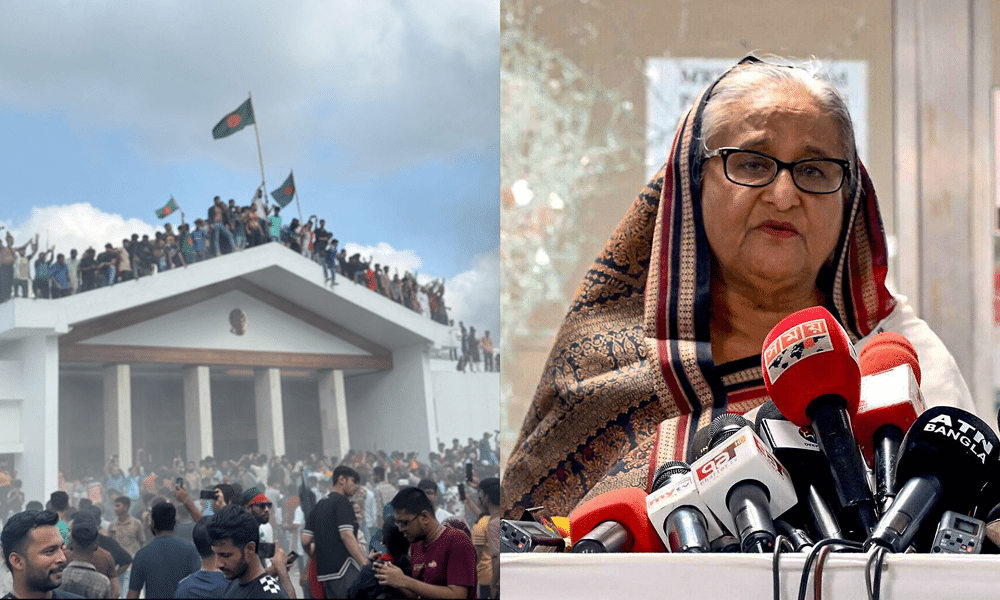Bangladeshi Prime Minister Sheikh Hasina’s 15-year rule ended dramatically on Monday as she fled the country following weeks of deadly protests. The military has announced it will form an interim government, seeking to restore order and stability.
Since early July, Hasina attempted to quell nationwide protests against her administration. However, after a brutal day of unrest on Sunday that resulted in nearly 100 deaths, she fled the capital, Dhaka. On Monday, Bangladesh’s army chief, General Waker-Uz-Zaman, confirmed in a state television broadcast that Hasina had resigned and the military would oversee the formation of an interim government.
An aide told Al Jazeera that Hasina boarded a military helicopter as huge crowds defied a national curfew and stormed her palace. Her departure followed weeks of intense protests, during which 300 people lost their lives. Sunday’s violence prompted the imposition of a curfew, yet defiant protesters continued to rally, with crowds swelling in the capital.
Despite soldiers patrolling the streets on Monday, protesters remained resolute, calling for a march on Dhaka. The prime minister’s palace was eventually stormed by vast numbers of demonstrators, preventing Hasina from delivering a speech. By early afternoon, the mood in Dhaka shifted to celebration as news of Hasina’s departure spread.
Al Jazeera’s Tanvir Chowdhury, reporting from Shahbagh Square, the epicentre of the student protests that began last month, described the scenes in the capital as unprecedented. “Everybody is celebrating, not just students – people from all walks of life. They said this had to happen; democracy was squeezed, and now we are free,” Chowdhury reported.
Protesters expressed a clear message: any future leadership must heed their demands for democracy and accountability. “Whoever comes to power next will now know that they won’t tolerate any kind of dictatorship or mismanagement and that the students will decide,” Chowdhury added.
Bangladesh’s history of military rule in the 1970s and 80s following its independence from Pakistan in 1971 has left many wary of a potential return to such governance.
General Waker-Uz-Zaman sought to reassure the nation, urging citizens to trust the army to restore peace and ensure justice for those affected by the protests. He called on the public to exercise patience and refrain from violence and vandalism.
“We have invited representatives from all major political parties, and they have accepted our invitation and committed to collaborating with us,” the general announced. He acknowledged the army’s significant challenges ahead, echoing concerns from Irene Khan, a UN special rapporteur.
The protests began over a controversial government job quota scheme, leading to a month-long crackdown involving the closure of universities and the deployment of police and military forces. Despite a nationwide curfew and internet blackout imposed by Hasina, the protests continued. The country’s top court eventually ruled to scale back the contested quotas, but the movement had already evolved into a nationwide uprising demanding Hasina’s resignation and accountability for the deaths.
“Bangladesh has, of course, an enormous task ahead,” Khan stated. “The previous government had driven this country into despair, and there would be a lot of hard work to do to build it up but most of all I think it’s extremely important that the army respect human rights.”
Thomas Kean, a Senior Consultant for Crisis Group, emphasized the opportunity to rebuild democracy in Bangladesh. “The current crisis presents an opportunity to put Bangladesh back on the path of genuine democracy and move beyond the hyper-partisan, winner-takes-all electoral dynamics that have caused so much damage over the past three decades,” he told Al Jazeera.
The protests have also resulted in significant destruction. Demonstrators broke into and damaged the residence of Home Minister Asaduzzaman Khan in Dhaka’s Dhanmondi area. Smoke was seen coming from the building after protesters stormed the gates. Elsewhere, protesters took furniture from Hasina’s office and damaged a statue of her father, independence leader Sheikh Mujibur Rahman. A memorial museum to Mujibur was also set on fire by demonstrators.
In Sylhet, the offices of the deputy commissioner and superintendent of police were reportedly set on fire, with the homes of several councillors also attacked.
As Bangladesh faces this critical juncture, the nation looks to the interim government to pave the way for a return to stability and democratic governance.

